Can You Battle Bugs and Weeds the Organic Way?
 20 February 2018
20 February 2018 
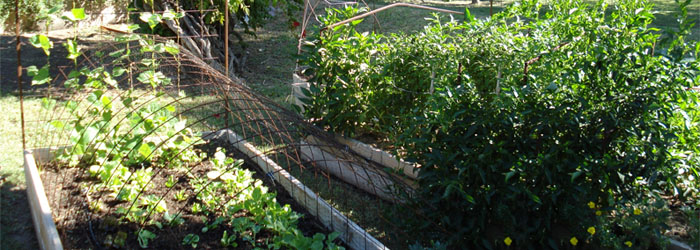
Alternative solutions for your yard
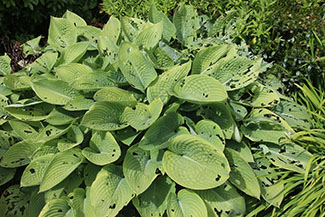
Many homeowners would like to garden organically, but they don't completely know what that means in their own yards.
The U.S. Department of Agriculture Web site says that "organic" is "a labeling term for food produced through methods that integrate cultural, biological and mechanical practices." In general, these practices "promote ecological balance and conserve biodiversity." That's pretty complicated, and maybe you can't achieve that in your own backyard. But generally, we'd all like to do the right thing whether we're growing food or flowers or even just cactuses in our yard. So, here are a few suggestions:
Make sure that those pests are really causing damage.
If there is only a small problem, you might want to wait and see before you take drastic action. A tip from a nursery owner: Well-fertilized plants can better withstand pesky bugs and drought.
You can make your own bug and weed killers.
There are home recipes that use things like soap and water to kill weeds and bugs. You'll find them all over the Internet. By the way, removing weeds will help in controlling bugs.
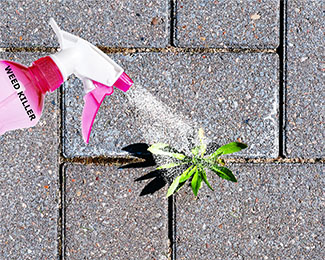
One of our staff members has a "secret" formula for "terminating" weeds: a gallon of vinegar, plus a cup of table salt and an 1/8 cup of a gentle liquid dish soap. He uses a pump sprayer full of his solution on broadleaf weeds, spurge and Bermuda grass; the pesky weeds are goners in 24 hours. Of course, using salt may cause a problem with your soil or with valuable plants and all soaps aren't always organic.
Test your own products.
If you want to try out a homemade recipe, test it on a small patch in your yard in the beginning. You don't want to go too far and damage important plants. Keep the damage to a minimum by restricting the area and covering up your favorite plants with some kind of temporary shelter.
If that homemade anti-bug compound you mix up in your kitchen has a lot of common foods or substances as ingredients – things like vinegar, garlic, onion and soap -- it can still be extremely harmful to pets and humans who might accidentally taste it. You might even kill good bugs and bad at the same time with those homemade recipes. So handle these potions carefully – just as you would with bleach or detergent or kerosene. Label bottles of the solution and keep them on high shelves where children can't reach them.
Use of commercial products.
There are also commercially available products on the market that some gardeners prefer because they seem more natural. One of them is neem oil, a naturally occurring pesticide made from seeds of the neem tree, a native plant of India. It has become widely popular with organic farmers. It kills many kinds of bugs and pests and is not believed harmful to humans or mammals, birds, and bees, lady-bugs or butterflies. Another is a Bonide product -- Captain Jack's Dead Bug Brew -- containing spinosad, a natural substance made by a soil bacterium that is toxic to various pests. Spinosad has been approved for use in some products applied in organic farming.
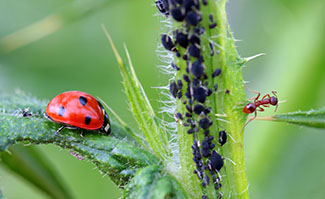
Fight bugs with bugs.
You can buy critters like praying mantises and lady-bugs that will eat some of the bad bugs. Nurseries sell these beneficial insects. Put the box of lady bugs in your vegetable patch the first night after you buy them; then open the box the second night in order to introduce them to your yard gradually. If a mantis should land on your hand or arm when you're working in the garden, don't be startled and don't swat at it. These helpful bugs will not stay in your yard forever although mantises can live longer.
Remove bugs by hand.
Think about the squash-and-remove possibilities for troublesome bugs, especially if you have a very small garden or yard. Remove bugs by hand, but be sure to wear gloves. You can shake them off branches into a pail of soapy water; you can also spray pests with your garden hose to wash them off plants. Limit the damage by removing plants or branches that pests have eaten or spoiled.
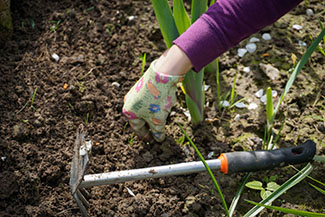
Most homeowners don't want to use strong pesticides.
Sometimes strong pesticides may be necessary. Before buying or using one, be sure that you have accurately identified the bug or pest causing a problem in your yard. Use your phone to snap a photo of the plant or tree that is deteriorating and take it with you to a nursery. Perhaps you can get a landscaping expert to visit your yard to give you some advice.
You want to buy the pesticide that will be most effective and that has the fewest risks. So read labels carefully and ask questions. Don't assume that more is better and never use any of those outdoor pesticides indoors. Try not to buy more of the chemical than you can use up quickly, and don't dump leftovers into the ground or down a drain.
###
Photo Credits:
RELATED CONTENT:
- Blog: How Pavers Can Save Money And Reduce Home Maintenance
- Blog: Beneficial Bugs We May Want In Our Yard
- DIY FAQ: How often should I apply a pest-control product?
- Podcast: How to Fight Back Against Bugs That Scare Us The Most
Print this page
recent post
- Duck, Duck, Duct! How Often Should Ductwork Be Cleaned?
- Vinyl vs. Fiberglass Windows: Which Is The Better Choice Of Replacement Window?
- We May Be The Grand Canyon State, But The Rocky Mountains Are Important For Arizona
- Welcome to Arizona! Things A Newbie to Arizona Should Know
- The Pros & Cons of Buying A Flipped House
- Getting In On The Ground Floor
- Why It’s More Critical Than Ever To Get Your AC Serviced Before Summer
- The Reality of Remodeling
- What To Look For When Comparing Your Roofing Quotes
- What To Expect When Buying New Windows & Doors
